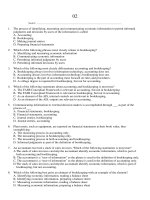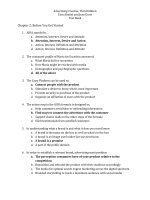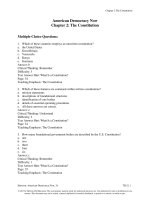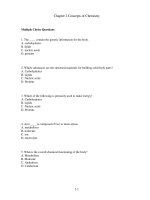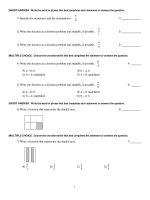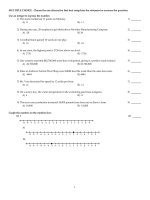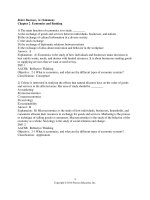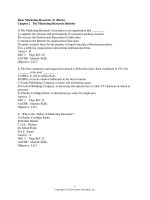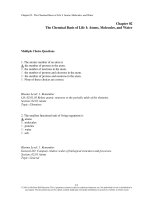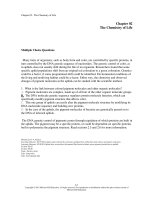Advertising creative 3rd edition altstiel test bank
Bạn đang xem bản rút gọn của tài liệu. Xem và tải ngay bản đầy đủ của tài liệu tại đây (539.37 KB, 3 trang )
Advertising Creative, Third Edition
Tom Altstiel and Jean Grow
Test Bank
Chapter 2: Before You Get Started
1. AIDA stands for…
a. Attention, Internet, Desire and Attitude
b. Attention, Interest, Desire and Action
c. Action, Interest, Definition and Attention
d. Action, Interest, Definition and Attitude
2. The consumer profile of Maria for Excedrin answered:
a. What Maria did for recreation
b. How Maria might be reached with media
c. Demographic and psychographic questions
d. All of the above
3. The Copy Platform can be used to:
a. Connect people with the product
b. Stimulate a desire to know what’s most important
c. Provide security in purchase of the product
d. Organize an affiliation of users with the product
4. The action step in the AIDA formula is designed to:
a. Help customers avoid false or misleading information
b. Find ways to connect the advertiser with the customer
c. Support claims made in the other steps of the formula
d. Elicit testimonials from satisfied customers
5. In understanding what a brand is and what it does you must know:
a. A brand is the name on the box as well as what’s in the box
b. A brand is an Image used under fair use provisions
c. A brand is a promise
d. A part of the public domain
6. In order to establish a relevant brand, advertising must position:
a. The perception consumers have of your product relative to the
competition
b. Reposition and rebrand the product with their audience accordingly
c. The media for optimal search engine marketing across the digital spectrum
d. Branded storytelling to reach a maximum audience with social media
Advertising Creative, Third Edition
Tom Altstiel and Jean Grow
Test Bank
7. Resonance takes place when the stimuli put into your communication:
a. Exceeds a superlative amount of attention by the audience
b. Avoids exaggeration, hyperbole, and extraneous attention
c. Overcomes the obvious falsity of the product claims
d. Evokes meaning in a listener or a viewer
8. The three types of relationships between parent and sub-brands include:
a. Co-drivers
b. Equitable drivers
c. Semi-Endorsers
d. Distractors
9. Guidelines for successful brand extensions include:
a. Screening all new brand extensions for congruence
b. Earmarking all the compromises other brands make
c. Identifying how your brand can emphasize profits
d. Eliminating all brand packaging that is co-congruent
10. People align themselves with:
a. Satisfaction of their wants and needs along the consumer continuum
b. The happiest brands they can find in comparison to generic brands
c. A brand that reflects what they see when they look in the mirror
d. Values and ideas consistent with fair trade practices and eco values
True/False
11. Features and benefits must be tied together in the customers mind
a. T
b. F
12. Ethnographic research can be used to elicit the inner feelings of the customer
a. T
b. F
13. Account planning is really all about solving the clients problem
a. T
b. F
14. Research always replaces insight when it comes to interpreting research findings
a. T
b. F
Advertising Creative, Third Edition
Tom Altstiel and Jean Grow
Test Bank
15. The consumer profile essentially answers the classic five W questions of journalism
a. T
b. F
Essay
16. Please discuss the differences between objectives, strategies and tactics.
17. Can you discuss the origins of account planning and its role in the advertising process?
18. How might ethnography and/or projective techniques be used to help you to better
understand your target audience?
19. Please describe the differences between features and benefits.
20. Why is storytelling so important to the branding process?
